|
|
|
Sort Order |
|
|
|
Items / Page
|
|
|
|
|
|
|
| Srl | Item |
| 1 |
ID:
139725
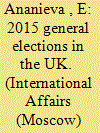

|
|
|
|
|
| Summary/Abstract |
Labour, Lib-Dems and UKIP suffered a crushing defeat, along with the analysts (me included) who had never expected that the Tories would win by a vast majority to knock together a one-party cabinet. For at least a month and a half before the elections, all public opinion polls indicated that the two leading parties were running neck and neck, so to speak with about 33-34 percent of the voters prepared to support either Labour or Tories. The aggregate rating of the smaller parties (slightly less than 70 percent) indicated that they stood a good chance to get a place in the sun.
|
|
|
|
|
|
|
|
|
|
|
|
|
|
|
|
| 2 |
ID:
149204
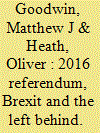

|
|
|
|
|
| Summary/Abstract |
Why did Britain vote for Brexit? What was the relative importance of factors such as education, age, immigration and ethnic diversity? And to what extent did the pattern of public support for Brexit across the country match the pattern of public support in earlier years for eurosceptic parties, notably the UK Independence Party (UKIP)? In this article we draw on aggregate-level data to conduct an initial exploration of the 2016 referendum vote. First, we find that turnout was generally higher in more pro-Leave areas. Second, we find that public support for Leave closely mapped past support for UKIP. And third, we find that support for Leave was more polarised along education lines than support for UKIP ever was. The implication of this finding is that support for euroscepticism has both widened and narrowed—it is now more widespread across Britain but it is also more socially distinctive.
|
|
|
|
|
|
|
|
|
|
|
|
|
|
|
|
| 3 |
ID:
138905
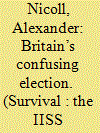

|
|
|
|
|
| Summary/Abstract |
Were it to be a straightforward ‘economy, stupid’ contest, the Conservative Party, led by Prime Minister David Cameron, might be expected to triumph in Britain’s 7 May 2015 general election. The government that took office in 2010, a coalition between the Conservatives and the third-placed Liberal Democrats, inherited a large budget deficit and a steep recession that had
begun with the 2008 financial crisis.
|
|
|
|
|
|
|
|
|
|
|
|
|
|
|
|
| 4 |
ID:
092641
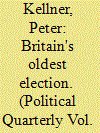

|
|
|
|
|
| Publication |
2009.
|
| Summary/Abstract |
Fringe political parties did well in the European Parliament elections in June 2005. The British National party won their first seats; altogether, four in ten British voters supported a party not represented in the House of Commons at Westminster. YouGov questioned more than 32,000 electors at the time of the election, in order to find out who voted for each party and why: the sample was big enough to enable robust analysis to be done on the BNP, UKIP and Green vote, as well as the supporters of Labour, the Conservatives and the Liberal Democrats. YouGov's findings show that there was disillusionment with the traditional main parties, and fears for the future, that were felt by voters across the political spectrum, and not just the supporters of the fringe parties.
|
|
|
|
|
|
|
|
|
|
|
|
|
|
|
|
| 5 |
ID:
144831
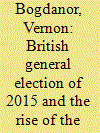

|
|
|
|
|
| Summary/Abstract |
Many on the left hoped that the 2015 general election in Britain would prove a social democratic moment. Instead, it proved a nationalist moment, since the only parties radically to increase their vote were UKIP and the SNP. This mirrored trends on the Continent, where nationalist parties on the right and the left have been the beneficiaries of the financial collapse of 2008. These parties exploit a new social cleavage between those who benefit from globalisation and those left behind. The new parties exploit issues of identity rather than economics, and these issues—whether Britain remains in the European Union, whether mass immigration continues and whether Scotland remains in the United Kingdom—are likely to dominate the 2015 parliament.
|
|
|
|
|
|
|
|
|
|
|
|
|
|
|
|
| 6 |
ID:
138182
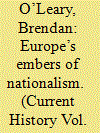

|
|
|
|
|
| Summary/Abstract |
Though cosmopolitans, imperialists, theocrats, and jihadists wish it were otherwise, nationalism is the most potent principle of legitimacy in the modern world. The principle of national self-determination holds that nations should be freely and severally institutionally expressed, and ruled by their co-nationals in sovereign nation-states or in power-sharing arrangements with their peers in multinational states.
|
|
|
|
|
|
|
|
|
|
|
|
|
|
|
|
| 7 |
ID:
138050


|
|
|
|
|
| Summary/Abstract |
THE BAFFLED European and international media described the results of the May 2014 elections to the European Parliament as revolutionary. On the eve, there had been a lot of talk that the traditional parliamentary majority could be pushed aside; immediately after the elections, the result looked as a political earthquake of sorts.
|
|
|
|
|
|
|
|
|
|
|
|
|
|
|
|
| 8 |
ID:
169218
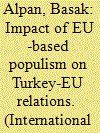

|
|
|
|
|
| Summary/Abstract |
The May 2019 EP elections once again highlighted the current cultural backlash throughout Europe against progressive values such as cosmopolitanism and multiculturalism, which impacts on the ‘future of Europe’ debate, raising important questions for the evolution of Turkey-EU relations. Even though Turkey is no longer a hot topic in EU political parlance and public opinion, opposition to Turkish EU membership continues in the form of nativism, particularly with reference to the issues of immigration and Islam, as the cases of AfD in Germany and UKIP in Britain show.
|
|
|
|
|
|
|
|
|
|
|
|
|
|
|
|
| 9 |
ID:
177976
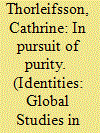

|
|
|
|
|
| Summary/Abstract |
Based on multi-sited fieldwork amongst leaders and supporters of populist radical right parties in the UK and Hungary, this article examines how the boundaries of the nation were reinforced and reimagined in the context of the ‘refugee crisis’ in 2015. Examining processes of racialization propagated by the UK Independence Party (UKIP) and the Hungarian Jobbik party, it suggests that the figure of the Muslim migrant served to rejuvenate violent imaginaries of ethno-racial and religious-civilizational difference. UKIP did not seek to reinforce national identity around a whiteness that was explicitly racially marked, but rather referred to culture grounded in (Judeo) Christian civilization as a basis of inclusion and exclusion. In contrast, in Hungary, supporters emphasized ethnic criteria for inclusion, thus challenging the basic values and principles underlying liberal democracy. In both contexts, anti-immigration discourses claiming the protection of ethno-racial or cultural purity, served a similar function; to re-territorialize white identities.
|
|
|
|
|
|
|
|
|
|
|
|
|
|
|
|
| 10 |
ID:
155405
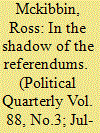

|
|
|
|
|
| Summary/Abstract |
This was the most interesting election of my lifetime, and in many ways the most surprising. Quite why what happened actually happened, we don't altogether know. For the most part, we can only speculate. The most remarkable of the election's results was the return of the two-party system to England. The two major parties together won eighty-eight per cent of the votes cast—a figure not seen since the 1970s. At one go, this reverses a tendency apparent since the late 1950s, which was for the proportion of the vote won by the Conservatives and Labour to fall—not steadily, but remorselessly. Furthermore, there were perfectly good historical and sociological reasons for this; and of the two parties, they harmed Labour most. At this election, the increase of the Tory vote was the easiest to explain—or apparently the easiest. The most difficult to explain was the extraordinary rise in the Labour vote. International experience, as well as our own, suggested that the condition of the social democratic parties everywhere was almost terminal: the collapse of the French Socialist Party merely the most extreme example of this. It is true that the evidence could be a bit mixed. The Australian Labor Party has staged an unexpectedly strong recovery in the last couple of years, but there was little to suggest that the British Labour Party had done so.
|
|
|
|
|
|
|
|
|
|
|
|
|
|
|
|
| 11 |
ID:
138890
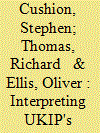

|
|
|
|
|
| Summary/Abstract |
UK broadcasters came under fire for the amount of airtime UKIP and its leader Nigel Farage received after the party won the most votes in the 2014 EU election. Our content analysis of television news during the 2009 and 2014 campaigns found little bias in terms of soundbites, but in the more recent election Farage visually appeared in coverage to a greater degree than other party leaders. Moreover, two core UKIP policies—being in or out of Europe and immigration—dominated coverage in 2014. We suggest the ‘UKIP factor’ and the media's fascination with Nigel Farage help explain why the 2014 campaign was more visible on television news than was the case in 2009 and was largely reported through a Westminster prism. Although television news bulletins attempt to impartially report elections, the 2014 campaign agenda was largely contested on UKIP's ideological terrain and the party's electoral fortunes.
|
|
|
|
|
|
|
|
|
|
|
|
|
|
|
|
| 12 |
ID:
123780
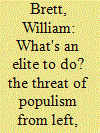

|
|
|
|
|
| Publication |
2013.
|
| Summary/Abstract |
Anthony Painter's report for Policy Network correctly describes populism as a 'democratic argument' which sets up a morally pure 'people' against vilified 'elites', in binary opposition. This is an argument which is increasingly prominent in political discourse, whether the elites in question are political, financial or technocratic. Painter focuses on the now-familiar 'radical right-wing' version of populism, as reflected across Europe in the rise of parties such as the UKIP. He omits discussion of other types of populism (of the left and centre), which perhaps represent the future for populist politics.
|
|
|
|
|
|
|
|
|
|
|
|
|
|
|
|
|
|
|
|
|